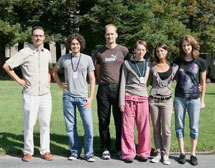
Handy Links
SLAC News Center
SLAC Today
- Subscribe
- Archives: Feb 2006-May 20, 2011
- Archives: May 23, 2011 and later
- Submit Feedback or Story Ideas
- About SLAC Today
SLAC News
Lab News
- Interactions
- Lightsources.org
- ILC NewsLine
- Int'l Science Grid This Week
- Fermilab Today
- Berkeley Lab News
- @brookhaven TODAY
- DOE Pulse
- CERN Courier
- DESY inForm
- US / LHC
SLAC Links
- Emergency
- Safety
- Policy Repository
- Site Entry Form

- Site Maps
- M & O Review
- Computing Status & Calendar
- SLAC Colloquium
- SLACspeak
- SLACspace
- SLAC Logo
- Café Menu
- Flea Market
- Web E-mail
- Marguerite Shuttle
- Discount Commuter Passes
-
Award Reporting Form
- SPIRES
- SciDoc
- Activity Groups
- Library
Stanford
Around the Bay
INFN Exchange Students Explore Physics at SLAC
As summer draws to a close, four visiting students from Italy are wrapping up two months of hands-on physics at SLAC. The students spent their summer in data analysis and computing activities, working with mentors in the BaBar collaboration.
Italy's National Institute for Nuclear Physics, INFN, participates in this yearly exchange program with the Department of Energy. University students across Italy can apply. Those selected spend two months working on a research project at a host facility supported by the DOE.
"My advisor [at Pisa University in Italy] suggested that I come here to do some research in a very qualified place," explained Francesca Pacini, who has been working on the data analysis of the decay of Ds particles. "Right now I am doing the last part of the analysis," he said. "In the end, I hope to be able to do the whole process."
Caterina Monini, who studies nuclear physics in Italy, has been working in the BaBar computing group, creating an archive of data that can be more easily accessed by physicists in the future. "It has been a great experience to learn some programming language, something about BaBar code," Monini said of her time at SLAC.
All four students—Caterina Monini, Francesca Pacini, Francesca Ungaro and Stefano Zambito—attend different universities in Italy and are very near to completing the equivalent of the American masters degree. All expect to continue on to doctoral programs.
"This work will hopefully be my graduate thesis," explained Zambito, who has helped update the charmonium group analysis. He said that his work this summer has taught him how to perform the analysis and use the BaBar data set, a good first step towards future projects.
"[Stefano] can continue to work on the project in Italy and work towards his higher degree," explained Bryan Fulsom, Zambito's mentor. "The program gives [the students] an opportunity to be involved directly with the people who worked with BaBar."
Nearly all of the students expressed wishes to do their doctoral thesis on work related to BaBar.
"We have a well established infrastructure so they can do something interesting," said Alesssandro Gaz, SLAC mentor for Francesca Ungaro. In return, the students have aided continuing BaBar research. "There is still a lot of work to be done even though BaBar is finished running," Fulsom said.
Ungaro said the program was a great opportunity to learn about B meson physics research. "I like the fact that I can know a bit about my work before I graduate," she said.
"It's been fun to have people to explore the area with," Pacini said of her time with her fellow exchange students. And as for her time at SLAC? "Everyone is really nice, and it was a pleasure to work here and have a taste of American research."
—Lauren Knoche
SLAC Today, September 3, 2009
